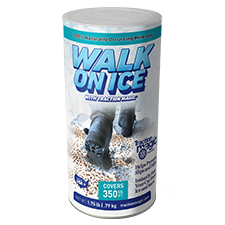How To Determine The Best Temperature To Pour Concrete At?

Both hot and cold conditions can challenge your concrete pouring process. As too cold or too hot, both temperatures may cause cracks and reduce the durability of your concrete driveways, sidewalks, patios, and other construction. Therefore, before the winter strike, you start thinking, ‘What can I use to melt ice on concrete?’.

Let’s First Learn More About Concrete To Understand The Ice Melting Process.
Things To Consider While Pouring Concrete
It is necessary to determine the best temperature to pour concrete at. The best temperature advised by the expert for concrete pouring is between 40 °F and 60 °F.
Since the weather will not always be suitable for the concrete pouring, but the work must go on, some support like heated enclosures or insulated blankets can be used in cold weather. Similarly, in hot weather, you may take the help of windbreaks, sunshades, and evaporative retarders for proper curing.
Points To Follow While Pouring Concrete In Cold Weather
Cold weather may freeze the water inside before the concrete sets. So it is essential to be cautious and follow these points:
– Keep the concrete in a dry and warm location.
– Melt the frozen ground, snow, and ice with heaters
– Use equipment and product that are designed to cure fast in cold weather
– Use hot water in the concrete mixture.
– Use squeegees or a vacuum to remove excess water immediately.
Points To Follow While Pouring Concrete In Hot Weather
When the temperature is above 60 °F, and you have to pour the concrete, you have to be prepared to combat the heat, strong wind, and humidity by following these points:
– Keep the concrete in the shade or cool areas before using
– Choose the less hot time of the day.
– Use of Sunshades and windbreaks.
– Pour the water mixed concrete without delay.
What Can I Use To Melt Ice On Concrete?
For the longevity of your concrete, it is essential to do regular maintenance and apply the least harmful ice melt products. There is a range of ice melt combinations available on the market, Sodium Chloride, Calcium Chloride, Magnesium Chloride, and Urea-based ice melt. Property owner wanders to select the best economic and practical ice melt; they can do an organic search on a search engine as “Best bulk ice melt near me.”
The products containing Salt and Chloride element are unsafe and can cause cracks to your concrete and corrosion to the metal and rebar. At the same time, urea-based ice melts are natural and least harmful to concrete and vegetation.
Safe Thaw: Safest Bulk Ice Melt Near Me
Safe Thaw is a natural urea-based ice melt that is safe on concrete. It gently melts the ice and does not allow the brine to reform the ice to protect concrete from cracks and increases its longevity.
The repetitive freeze-thaw cycle will damage your property, metal, vehicles, and machinery. This green option is non-corrosive and non-conductive. Also, it is eco-friendly and gentle on vegetation.
100% salt & chloride-free, fast acting Ice Management Solution
Conclusion
Weather and temperature directly impact the concrete construction and its life; however, the above-explained points will help you to do a robust construction under any temperature, and the proper ice melt will increase the longevity of your concrete.
Try Also Our Other Winter Safety Products:
Safe Paw
The Original and #1 Selling Pet and Child Safe Ice Melt for over 20 years. Guaranteed environmentally safe –It won’t harm animals or children, and it won’t damage your property. That’s Safe Paw. Safe Paw can change how winter affects our planet.

Walk On Ice
The handy disposable canister can be taken everywhere, with the same 100% naturally occurring minerals that provide instant traction on ice or snow. Use it on sidewalks, steps, or as an instant traction agent for your car.


